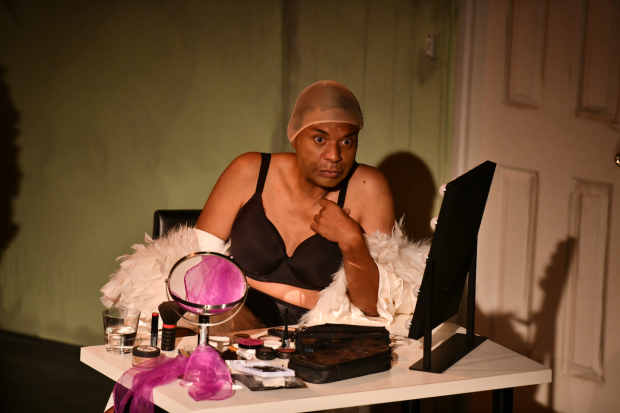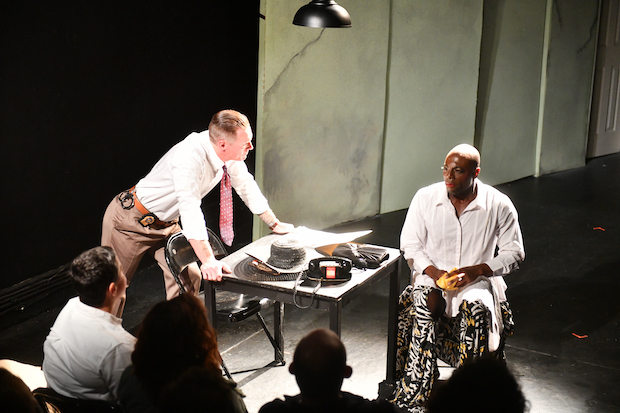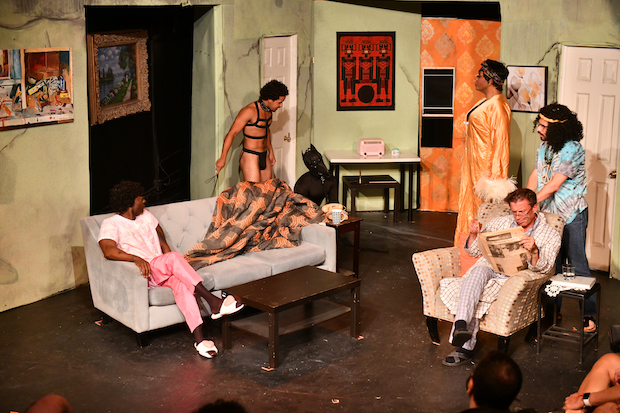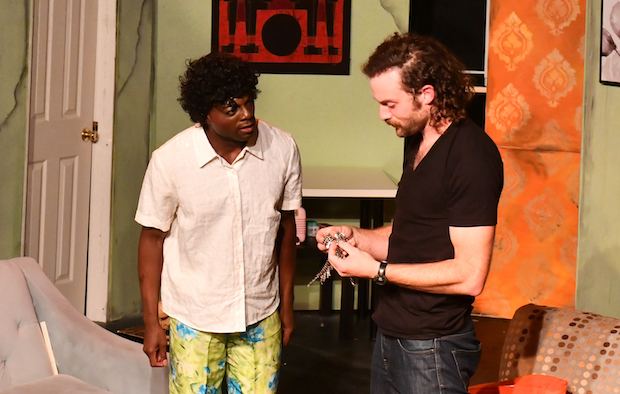Review: Case Closed: The Dorian Corey Story Exhumes the Mummy in the Drag Queen's Closet
Jeffrey S. Jones has written a compelling family drama disguised as true crime.

(© Nick Starichenko)
I have always admired the Gene Frankel Theatre, that outpost of off-off-Broadway hiding between overpriced sushi restaurants and Anderson Cooper's Equinox, deep in the heart of NoHo. Like that older tenant in your building who secured a rent-controlled apartment in 1969, it nobly survives in a thoroughly gentrified city that no longer seems to want it. That makes it the ideal venue for Case Closed: The Dorian Corey Story, a gripping portrait of a group of similarly unwanted New Yorkers who nevertheless persist, and manage to change the culture of the city (and America) in the process.
Playwright Jeffrey S. Jones finds his inspiration in the life of Dorian Corey, the veteran drag performer who played the role of our world-weary tour guide in the 1990 documentary Paris Is Burning, about ball culture in Harlem. "I was going to be the first female impersonator to break into the mainstream," Corey says as she applies makeup and peers into her vanity. While that honor (and the fabulous wealth of the Drag Race empire) ultimately went to RuPaul, Corey ended her days in the AIDS ward of Columbia Presbyterian, leaving behind only a closet full of gowns — and one skeleton.
That would be Robert Worley, a troubled ex-convict whose earthly remains were discovered in a green-plaid garment bag in Corey's apartment following her death. The mystery of how they got there is still open (explored at length in the 1994 New York Magazine article "The Drag Queen Had a Mummy in Her Closet"). Jones presents his own theory of how events played out in this family drama dressed up in true crime drag.

(© Nick Starichenko)
The first act takes place in an NYPD interrogation room circa 1994, where Detective Dombrowski (an ultra-butch Jake Thomas) questions Velma (Isaac Dean), an elderly drag queen who lived with Corey (Scott Weston) for over a decade. The scene oscillates between this interview and Corey's dressing room, where she dispenses wisdom directly to the audience, as if we were all first-time drag princesses fresh off the bus from Tuscaloosa.
Act 2 flashes back to 1967 and takes us inside the fifth-floor Harlem apartment Corey transformed into a "gay finishing school" by sheltering all manner of misfits, from the teenage runaway Regina (a sweet-as-pie Grant Hale) to middle-aged alcoholic Willie (an appropriately pickled Frank Muni). This fragile ecosystem is compromised by the arrival of Bobby (Matt Braddak), Corey's handsome and troubled on-again-off-again boyfriend. By the conclusion of this two-and-a-half-hour drama, Jones provides a clear answer to his subtitle Who Killed Robert Worley? — one that you can probably guess on your own.

(© Nick Starichenko)
The production values in Case Closed are about what one would expect from an off-off-Broadway show unattached to an institutional theater, written and produced by the same person: Peta McKenna's set is a showroom of crooked doors and peeling paint (although this works well for Act 2). Costumers Dominique N. Mercado and Scott Stewart spin couture out of the flimsiest of fabrics (again, an authentic look for a group of people who likely dumpster dive in the west 30s). While director Laurence C. Schwartz hasn't come up with any clever staging techniques to overcome the material deficiencies of the production (the transitions are particularly deadly) he compensates by leading his cast to some of the best performances I've seen all year.
Weston is perfect as Corey, channeling the legendary queen and her distinctively blasé mid-Atlantic dialect, which makes her sound like she was raised by Bette Davis and Vincent Price (and in a way, she was). He exudes motherly warmth with foundling children like go-go dancer Manny (a fiery and vulnerable Marlon Alexander) and hippie law student Joseph (an adorable Spencer Gonzalez). As Bobby, Braddak plays the dead-beat daddy of the house, at once seductive and destructive. While his biker-Viking look doesn't adhere to the historical reality of Robert Worley (who was short, Black, and bespectacled), they easily serve to distinguish him as an outsider and a threat (an insert in the program makes it clear that Braddak is a last-minute replacement in the role of Bobby, one who has more than stepped up to the task).

(© Nick Starichenko)
The standout performance of the evening comes from Dean, who plays an older, jollier version of Velma in Act 1 before reverse-aging to her pricklier youth in Act 2. Dean delivers each line as a precision strike, throwing the kind of shade that would cause most flowers to instantly wilt. His banter with Weston could be a drag act on its own, and his scenes with Braddak are so scorching, they threaten to burn down the fire trap of a set. In his performance as Velma, Dean embodies the struggle between war and peace, community and individuality, fear and love, that governs the everyday life of a marginalized person in an unforgiving city.
In an age when 13-year-olds on TikTok parrot the lingo and dance moves pioneered by queer kids in Harlem four decades ago, we should recognize and honor the rich legacy people like Velma and Dorian created in a world that didn't want them, and gave them nothing. Case Closed does that, and more.








